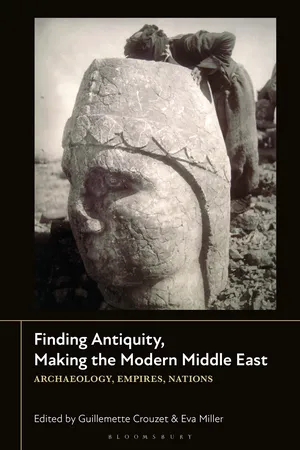
Finding Antiquity, Making the Modern Middle East
Archaeology, Empires, Nations
- English
- ePUB (mobile friendly)
- Available on iOS & Android
Finding Antiquity, Making the Modern Middle East
Archaeology, Empires, Nations
About this book
This volume presents innovative studies of how the emerging disciplines of archaeology and ancient history shaped the modern Middle East, and how they were in turn shaped by competing visions and agendas of empires and new nations. The Middle East was a region constructed through its putatively unique relationship to the whole world's past-and its special relevance for the destiny of empires and nations. Over the course of the nineteenth and early twentieth centuries, European empires fought for influence and control over this 'cradle' of civilization, empire and monuments, and local powers and people in the Middle East worked with and against these historical and heritage frameworks in their own quests for self-determination. In this volume, contributors from the fields of history, archaeology and heritage explore how historical consciousness about the Middle East was contested in the nineteenth and early twentieth century through excavation and interpretation of the past. Chapters span West Asia and North Africa, covering Turkey, Iraq, Iran, Syria, Lebanon, Israel, Palestine, Egypt and Tunisia, and the imperial history of Britain, France, Germany and the Ottoman Empire. The result is an original contribution to our understanding of the origins and influence of Middle Eastern archaeology, which resonates today in contemporary discussions on heritage discourses and practices.
Frequently asked questions
- Essential is ideal for learners and professionals who enjoy exploring a wide range of subjects. Access the Essential Library with 800,000+ trusted titles and best-sellers across business, personal growth, and the humanities. Includes unlimited reading time and Standard Read Aloud voice.
- Complete: Perfect for advanced learners and researchers needing full, unrestricted access. Unlock 1.4M+ books across hundreds of subjects, including academic and specialized titles. The Complete Plan also includes advanced features like Premium Read Aloud and Research Assistant.
Please note we cannot support devices running on iOS 13 and Android 7 or earlier. Learn more about using the app.
Information
Table of contents
- Cover
- Half-Title Page
- Series Page
- Title Page
- Contents
- Acknowledgements
- List of Figures
- Notes on Contributors
- Abbreviations
- Foreword
- Introduction
- Part 1: Travellers and Takers
- 1 Housing the Mausoleum: British Travellers and Excavation in Bodrum, c. 1760–1870
- 2 Austen Henry Layard and the Cadi’s Letter: The Multiple Pasts and Futures of Nineteenth-century Mosul
- 3 Who Owns the Phoenician Past? German Orientalism and the Politics of Time and Space Across the Mediterranean
- 4 Near Eastern Studies in Germany and the Complex Involvement of German Jews with ‘the Orient’
- Part 2: Nationalism and Internationalism
- 5 Antiquities for ‘A’ Mandate: Internationalism, the Emergence of a Regime of Archaeology and the Reorganization of the Middle East, c. 1918–1939
- 6 Antique Nationalism: Archaeology and the Construction of the Nation in Egypt, Lebanon and Palestine-Israel
- 7 Who (or What) Is a ‘Phoenician’? The Complex History of an Ancient People in a Modern Society
- 8 Between Archaeology and Nationalism: The Iran Bastan’s Appropriation of the Imperial Museum Paradigm
- Part 3: Valuing Antiquities
- 9 The Traders: Archaeology, Family and Fortune between Saïda and Paris
- 10 Subjects of Destruction: Preservationism, Extractivism and Cultural Property in Egypt, 1882–1939
- 11 Who Is an Archaeologist? Deconstructing Archaeology in Palestine
- Part 4: Living with Antiquities
- 12 Excavating Iraq’s Past within the Pages of Lughat al-ʿArab, 1911–1931
- 13 Dismantling Nablus: The Samaritans, Orientalism and the Mandate Department of Antiquities
- 14 Destructing Middle Eastern and North African Archaeological Practices: An Indigenous Egyptian Counter-narrative
- Epilogue
- Bibliography
- Index
- Copyright